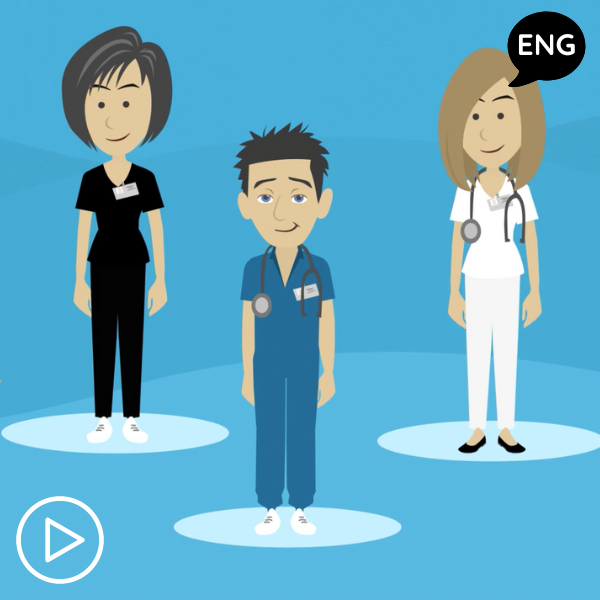The Advantages of Partnering With Your Cancer Care Team
Becoming Empowered: The Advantages of Partnering With Your Cancer Care Team from Patient Empowerment Network on Vimeo
Transcript:
Isabella:
Hi! I’m Isabella, and I recently completed my cancer treatment. And this is my nurse, Kevin.
Kevin:
Managing a patient’s cancer is truly a group effort, and you – as the patient – are at the center of that care.
In this video, Isabella and I are going to walk through who may be on your healthcare team and how you can work together to get the best possible care.
Isabella:
That’s right. I feel empowered knowing that I am an equal member of my care team and that I understand everyone’s role on the team.
Each member provides a different set of skills, and it’s important to put their expertise to work for YOU.
So, Kevin, tell us more about the key members of a cancer patient’s healthcare team.
Kevin:
Let’s start with the core medical experts who help lead and manage your care:
An oncologist is a doctor who specializes in diagnosing and treating cancer. There are different types of oncologists, and depending on your type of cancer and treatment approach, you may meet with several along the way.
- Medical oncologists treat patients with medicine.
- While a radiation oncologist treats patients with radiation.
- And a surgical oncologist is a surgeon who specializes in cancer.
You could also consider seeking a second opinion with another oncologist or a specialist that manages the type of cancer you’ve been diagnosed with.
Isabella:
That’s great advice, Kevin. I got a second opinion to confirm my diagnosis and to explore treatment approaches. After meeting with another oncologist, my husband and I decided we were confident in the care I was receiving.
Kevin:
That’s right, Isabella. A second opinion can make you feel empowered in your care decisions.
Isabella:
Okay, let’s talk about the other members of the healthcare team. What about nurses, like you?
Kevin:
Yes – nurses are an essential part of the team. There are oncology nurses, who specialize in caring for patients who have been diagnosed with cancer. And nurse practitioners and physician assistants may play a supportive role in your cancer care as well.
Isabella:
Yes! I see my PA regularly, and she has been a wonderful addition to my cancer team. She helps with ordering testing, including blood work and X-rays, and I feel like she listens and really cares.
There are other professionals who can help you manage your care, like:
- Patient navigators, nurse navigators, and social workers, who can assist with finding support services, such as counseling and financial resources.
- Then there are palliative care doctors and nurses, who help prevent and treat cancer symptoms and side effects.
Kevin:
I also want to mention one of the most important parts of wellness – mental health. Mental health professionals have special training and can listen to your concerns and can provide support through all phases of life with cancer. If you need help with any aspect of your care or mental health, reach out to your doctor or nurse – they can direct you to a team member that can help.
Isabella:
Great point, Kevin.
Another essential member of your team is a caregiver, which may also be referred to as a care partner. It can be a family member or a close friend – someone that you trust to join you at appointments and to talk through decisions with you. My husband was my care partner and my favorite member of my team!
Each of these team members plays a vital role. And you should utilize your WHOLE team – it really will make a difference in your overall health and wellness.
Kevin:
It’s also essential to continue seeing your primary care doctor. While your cancer team is helping create a treatment plan and to manage the cancer, your primary care doctor will continue managing other aspects of your health.
And, let’s not forget YOU. As an empowered patient, you are the most important member of your team, and decisions should revolve around you and your healthcare goals.
Isabella:
Now that we’ve reviewed the various members of the healthcare team, a great way to connect with your team is to make use of your patient portal. It’s a useful tool to help you navigate your healthcare; and it houses your health records and office visit summaries.
I use my patient portal all the time to access my test results and even to send messages to my healthcare team.
Kevin:
If you don’t have access or don’t know how to use to your patient portal, reach out to your doctor’s office for help – they usually have instructions to easily guide you through the setup process.
Isabella:
That’s right. Always ask for help when you need it.
Kevin:
Now, let’s review some steps to help you communicate effectively with your healthcare team:
- Talk about your healthcare goals, concerns, or any questions you may have with your doctor. Consider the question: what’s important to me?
- And don’t be afraid to speak up if something doesn’t feel right or if you have a new symptom or concern.
- Before an appointment, write down any questions you have, so you don’t forget them and take notes during the visit. You can also ask for your doctor’s permission to record the conversation.
- Ensure you have access to your patient portal and know how to use it.
- If necessary, ask for a translator and for materials in a language you are most comfortable with.
- Finally, download the guide that accompanies this video to help you recall what we covered.
Isabella:
So, what did you learn? Please click this link to access learning questions to test your knowledge.
Kevin:
To learn more about shared decision-making and patient empowerment, watch the next video in this series.
Thanks for joining us!




